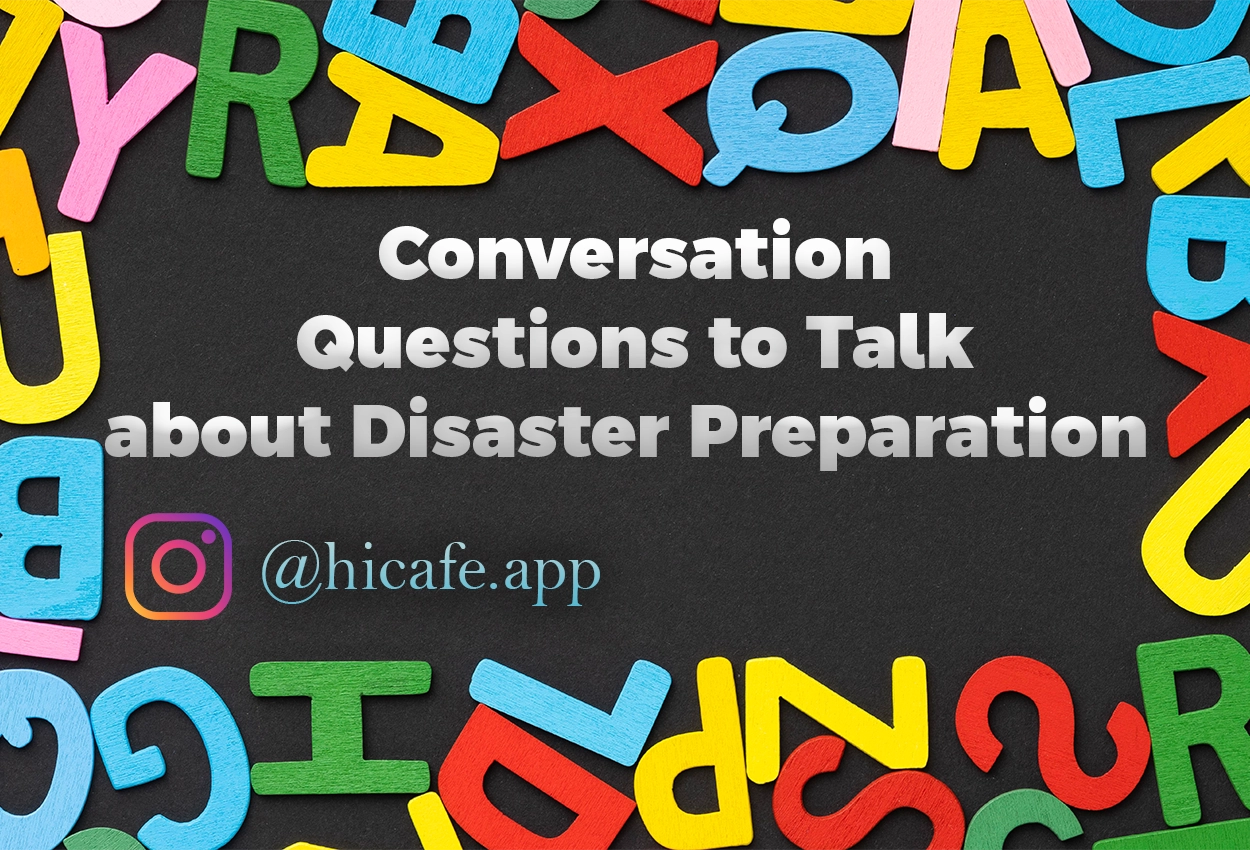Intermediate Level Conversations- Series 5- Lesson 6- Conversation Questions about Disaster Preparation
In this lesson, you learn 11 conversation questions about disaster preparation with sample answers for having a normal conversation discussing disaster preparation.
Previous Conversation Lesson
Conversation Questions about Books
Practice English Speaking by Talking about Disaster Preparation
Here is a list of 11 discussion questions with sample answers for practicing English speaking with your language partner.
- What can you do to prepare in advance for a disaster? Explain.
There are many things we can do to be ready! First, we should make sure we have a plan for our family. We need to know where we’ll meet up if we get separated, and we should practice our plan regularly. We should also have an emergency kit with essential supplies like food, water, a first-aid kit, flashlights, batteries, and a whistle. And, it’s super important to have enough cash on hand because the power might be out and credit cards won’t work. It’s also a good idea to have a list of important phone numbers, like emergency services and our family doctor. We should also know where the nearest evacuation centers are in case we need to leave our home.
- What sorts of preparations would you make if a typhoon was going to hit your area? Explain.
If a typhoon was approaching, we’d definitely need to prepare! First, we’d secure our home by boarding up windows and making sure anything that could blow away is stored inside. We’d also fill up all our containers with water and buy extra food. We’d make sure we have plenty of batteries and flashlights just in case the power goes out. We’d also gather all of our important documents, like passports and birth certificates, and put them in a waterproof bag. We’d make sure we have enough medication for our family in case we need to evacuate.
- What has your family done in the past to prepare for a disaster? Explain.
My family has always been pretty prepared. We have an emergency kit that we update every year, and we have a family plan for what to do in case of an emergency. We’ve also participated in earthquake drills at school and at our community center.
- What are some essential things you would need in your house in order to be prepared for a disaster? Explain.
We should have enough food and water to last at least three days. Power outages are common after disasters, so we need to have enough flashlights and batteries. Emergency radio will allow us to stay informed about emergency broadcasts. As I mentioned, credit cards might not work after a disaster, so it’s important to have cash on hand.
- How can you help your pet prepare for a disaster? Explain.
Our pets need to be prepared too! We should make sure they have a collar with their ID tag, and we should keep their vaccination records up to date. We should also have a carrier or crate for them, and we need to make sure they have enough food and water for several days.
- Where are some dangerous places to be in your house? Where are some safe places to be in your house?
Dangerous places to be in a house during a disaster include near windows, under heavy furniture, and in areas prone to flooding. Safe places include sturdy furniture, interior walls, and any room with a sturdy door.
- What could you say to someone who is frightened? Explain.
If someone is frightened, it’s important to stay calm and reassure them. I’d let them know that I’m there for them and that we’re going to be okay. I’d also try to distract them by talking about something else or doing an activity together.
- What are some problems people have right after a natural disaster? Explain.
People often face a lot of problems after a disaster, including loss of power and communication, damage to homes and businesses, lack of access to food, water, and other essential supplies, and increased risk of disease and injury.
- What are some short-term problems people might have after a disaster? Explain.
Short-term problems can include loss of income, lack of transportation, and increased crime. Unfortunately, crime rates often increase after a disaster.
- What are some long-term problems people might have after a disaster? Explain.
Long-term problems can include mental health issues, housing insecurity, economic hardship. People often experience anxiety, depression, and PTSD after a disaster. Many people lose their homes in disasters and may struggle to find new housing. Disasters can have a devastating impact on economies, leading to job losses and increased poverty.
- What are some health problems that might arise after a disaster? Explain.
After a disaster, people are more vulnerable to health problems like infectious diseases, respiratory problems, and mental health problems. Poor sanitation can lead to outbreaks of diseases like cholera, typhoid fever, and dysentery. Dust and smoke from damaged buildings can cause breathing problems. Trauma and stress can lead to anxiety, depression, and PTSD.
Next Conversation Lesson
Conversation Questions about Wedding
Related Conversation Lessons
None
Practice Conversation with HiCafe App
By using HiCafe App, you can join free discussion events and Practice English Conversation online or in-person and improve your verbal skills.
All Conversation Lessons
To see and read all of our conversation lessons, you can visit our Improve English Speaking Skills page.



